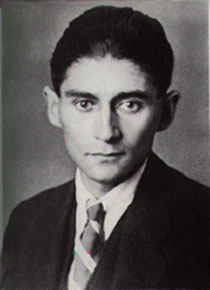
Monday, March 14, 2011
Franz Kafka
Although we already discussed Kafka's background today in class, I decided to further explore the complexity of the anguished author. Firstly, I will share what I learned about his political views. We discussed today that Kafka was against bureaucracy, but we didn't mention that he was a socialist. Kafka was drawn toward socialism in his youth and wore a red carnation to school to openly demonstrate his support of the party. This is also evident through a diary entry written during his adolescene in which he commented upon how the anarchist philospher, Peter Kropotkin, influenced him. Kafka even attended meetings of a Czech anarchist organization that opposed both military and religion, known as Klub Myladych. In terms of his personal life, Kafka had a few romantic relationships. Between 1912 and 1917 he corresponded with a woman from Berlin, named Felice Bauer, and proposed twice before the engagement was broken in 1917. Subsequently, he was involved in a brief affair with the Czech journalist Milena Jesenska in 1920. His most serious relationship was with Dora Diament, a young Orthodox Jewish woman. Aside from what we already mentioned in class today, in which ways do you all think Kafka's personal life influenced "The Metamorphosis"?


Subscribe to:
Post Comments (Atom)


5 comments:
I think that his religion and location are key to understanding some of Kafka's writing. As we mentioned, having a Jewish background in a predominately Catholic area causes a lot of issues, not to mention identity problems. Also as Samantha mentions, the romantic relationships Kafka had were not very stable. It seems that he was constantly searching for love but he could not find it. I think any author's background is key to their writing and I am sure we will continue to find similarities as we continue reading.
After reading the biography of Kafka given in the Norton Anthology, I realized how Kafka's family life influenced his writing. In "The Metamorphosis," he depicts a family who is heavily dependent on Gregor, whose transformation causes them all to become depressed. They do not even consider the possibility that Gregor could understand them, and the narrator implies that the family members were not close to one another even before Gregor's change. Kafka felt as though his father was overbearing; likewise, Gregor constantly worries about his father's opinions and seems to fear him. Gregor also longs for his mother, just as Kafka felt "deprived of maternal love" (Norton, page 944). Kafka, like Gregor, lived with his parents, even though he was unhappy with them.
His socialist views are quite evident in The Metamorphosis. As we discussed in class, the family member's preoccupation with material goods and wealth is a comment on the negative side of capitalism. The meaning of family life has been lost with capitalism because the focus transfers to financial worries instead of family connections. Kafka also comments on the state of the worker in a capitalist society. Gregor lives in a bad job situation. He must travel all the time and his constantly exhausted. Also, for the first time in 5 years, Gregor is late to work and immediately the worst is thought of him by his boss.
From the start, Kafka seemed to be alienated from society because he was born into a Jewish family in a predominately Catholic area. Not being able to associate with anything, Kafka dealt with an identity crisis. A similar theme is reflected in The Metamorphosis, with Gregor's identity. Readers cannot fully distinguish what type of animal Gregor is, which reflects Kafka's question of whether people can fully understand one another or not.
I think that it is important to remember that Kafka was writing around and during World War I. As I read, I found it odd that the war didn't find its way into the story. The narrator briefly mentions that Gregor was once a soldier in the army, but I believe that is the only reference to warfare in the entire book. However, I wonder if Kafka does not intend to remind us of the multitudes of young European men who died for the sake of their families. The life of a soldier is not very different from Gregor's, especially when one imagines the squalid lives and deaths of men in trenches.
Post a Comment